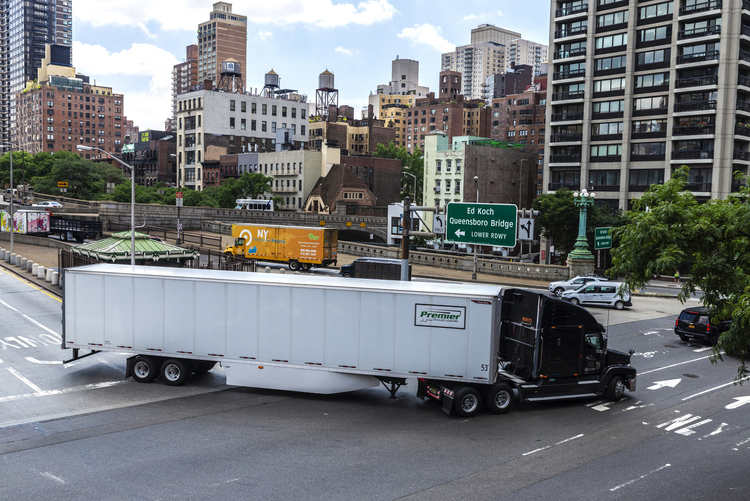New York City has designated certain major roadways as “truck routes”; if you drive a truck inthe city, you must stay on these routes. A truck can only be operated off truck routes in order to make a local delivery or pickup.
NYC truck routes are primarily relatively major roadways within the city. The regulations are in place to protect residents from the noise and congestion caused by trucks driving on smaller city streets. Trucks can only be driven on these smaller non-truck routes if absolutely necessary for deliveries or pickups.
Keep reading for more crucial NYC truck route laws and avoiding violations with the help of our skilled New York commercial driving violations lawyer.

Many truck route violations occur due to:
To avoid violations, always plan your route in advance using official NYC truck route maps rather than standard GPS systems.
Always use an official NYC truck route map: |
Truck route violations originally were zero-point violations. Today, these violations carry two points on your driving record and come with substantial fines. The financial penalties start high and increase significantly for repeat offenders.
If you’ve received a truck route violation, it’s advisable to consult with an attorney experienced in traffic and transportation law. The legal team at Feifer & Greenberg LLP can help you:
If you are a truck driver in NYC, know the truck routes. Download and review the most current NYC truck route map. Remain on these truck routes unless you must drive off the routes to make a pickup or delivery. If you do veer off a truck route, make sure you have paperwork documenting the delivery or pickup in question. Without this paperwork, expect a summons if you are pulled over.
As a fleet owner or manager, ensuring your drivers understand and comply with NYC’s truck route regulations is essential for avoiding costly violations and maintaining operational efficiency. Consider implementing these practices:
Check out this related article: |
Implement these measures to minimize disruptions and maintain regulatory compliance:
While Metropolitan Transportation Authority (MTA) bus drivers and other commercial bus operators are indeed commercial drivers requiring Commercial Driver’s Licenses (CDLs), they operate under different routing regulations than truck drivers. It’s important to understand these distinctions:
MTA and other commercial bus drivers can face unique challenges including:
In New York City, trucks and commercial vehicles are two distinct vehicle classifications.
Determining the correct vehicle classification is important for properly operating a truck or commercial vehicle in the City, as rules and regulations can vary depending on classification.
What constitutes a “truck” in New York City? Pursuant to Section 4-13 of the New York City Traffic Rules, a truck is defined as any vehicle or combination of vehicles designed for the transportation of property that has either two axles and six tires, or three or more axles.
The city maintains two distinct types of truck routes:
Understanding which routes apply to your specific situation is crucial for compliance with city regulations.
When operating off designated truck routes for a delivery or pickup, drivers must carry appropriate documentation that justifies their deviation from the truck route. This documentation should include:
For assistance with NYC truck route violations or other traffic-related legal issues, contact Feifer & Greenberg LLP. Our experienced attorneys understand the complexities of NYC’s transportation regulations and can provide the guidance you need to navigate these challenges. Whether you’re a bus driver with MTA or a fleet manager, we’re ready to help.
We have organized a statewide network of attorneys. In our network are both attorneys who work for Feifer & Greenberg and attorneys who work for other firms that regularly provide of-counsel representation to our clients. This statewide network allows us to match clients in a particular county or court with local attorneys who regularly appear on similar matters in the same county or court. It enables us to help clients anywhere in New York State and in our opinion provide particularly effective and affordable representation for our clients. Local attorneys can draw on their particular local experiences and, with travel time and expense removed from the equation, help us keep our legal fees low.
We recommend fighting almost all tickets. Even if the current NY traffic tickets aren’t particularly harmful, you have an incentive to keep your record clean for the future. Convictions quickly lead to surcharges, insurance increases and other complications. You should strongly consider any decision to pay a ticket without fighting.
Our lawyers are experienced, prepared attorneys who understand the nuances of fighting traffic tickets. Experience, preparation and good decision making help us to help our clients avoid points, surcharges, insurance increases and the other negatives that can easily result from a traffic ticket.
Feifer & Greenberg, LLP, 15 Maiden Lane, Suite 508, New York, NY 10038, (888) 842-5384
© 2023 | Privacy Policy